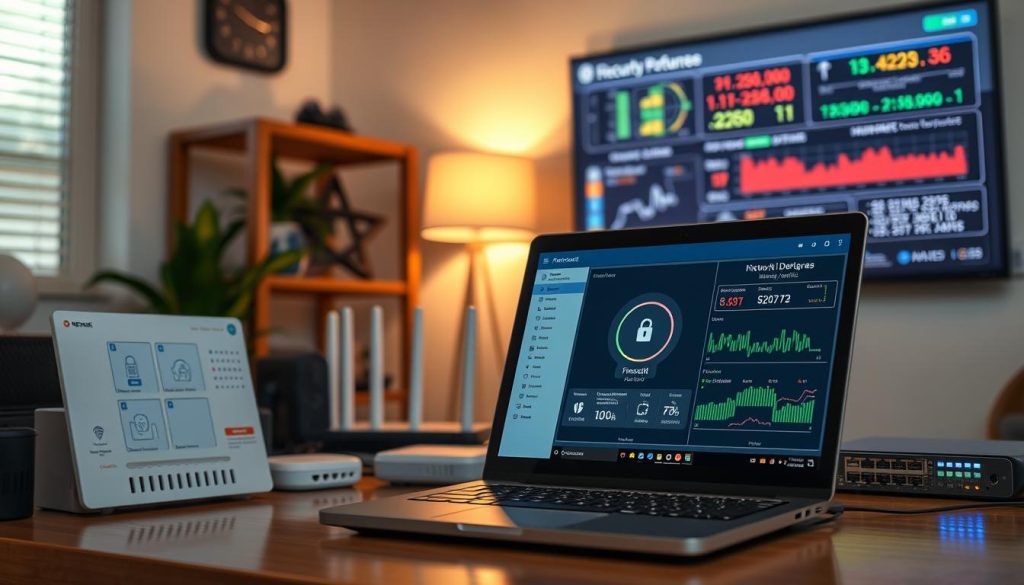When it comes to securing your home network, selecting the right firewall is crucial. You need a solution that balances ease of use with robust security features and customization options.
Configuring and maintaining a firewall can be a daunting task, especially for those without extensive technical knowledge. Your choice will depend on how much time you’re willing to invest in optimizing your firewall.
As you consider your options, you’ll want to weigh the benefits of different firewalls, such as pfSense and Sophos, to determine which one is the best fit for your home use. This comparison will help you make an informed decision.
Introduction to Firewalls
When it comes to safeguarding your network, firewall software comparison is key. A firewall acts as a barrier between your network and potential threats, controlling incoming and outgoing network traffic based on predetermined security rules.
An open-source firewall is a network security system available to the public for use, modification, and distribution. It’s especially attractive to startups, developers, and privacy-conscious individuals due to its transparency and customization capabilities.
Firewalls are crucial for network security as they help prevent unauthorized access to or from a private network while allowing authorized communication. They can be implemented in both hardware and software, or a combination of both.
Key Features of Firewalls
- Network traffic control
- Security rule enforcement
- Protection against unauthorized access
- Logging and monitoring network activity
When comparing different network security software, it’s essential to consider factors such as performance, ease of use, and the level of security provided. Open-source firewalls offer the advantage of community-driven development and customization, whereas commercial firewalls provide vendor support and often more user-friendly interfaces.
| Feature | Open-Source Firewalls | Commercial Firewalls |
|---|---|---|
| Customization | Highly customizable | Limited customization |
| Cost | Generally free or low-cost | Can be expensive |
| Support | Community-driven support | Professional vendor support |
Understanding these differences is vital in choosing the right firewall for your needs, whether you’re an individual user or a large organization.
Overview of pfSense
For those seeking a reliable and customizable firewall, pfSense is an excellent choice, built on the FreeBSD operating system. You can leverage its advanced features to secure your network effectively.
pfSense Community Edition (CE) is renowned for its robust capabilities, including Layer 3/4 filtering, VPN support, multi-WAN functionality, and traffic shaping. These features make it an ideal solution for various environments, from small to medium-sized businesses (SMBs) to educational institutions and DIY security setups.
Key Features of pfSense:
- Advanced firewall rules for granular control
- VPN support for secure remote access
- Multi-WAN support for redundancy and load balancing
- Traffic shaping for optimized network performance
- Extensive package system for added functionality
- User-friendly web GUI for easy management
You can further enhance your network security by utilizing pfSense’s package system, which offers a wide range of additional features and functionalities. This extensibility is one of the key advantages of choosing pfSense as your firewall solution.
When comparing pfSense to other firewall solutions like Sophos Firewall, its open-source nature and flexibility give it a distinct edge. You can customize pfSense to meet your specific security needs, making it a highly adaptable choice.
| Feature | pfSense | Sophos Firewall |
|---|---|---|
| Open-source | Yes | No |
| Layer 3/4 Filtering | Yes | Yes |
| VPN Support | Yes | Yes |
| Multi-WAN Support | Yes | Yes |
| Traffic Shaping | Yes | Limited |
As you evaluate the best open-source firewall for your needs, pfSense stands out due to its comprehensive feature set, flexibility, and the community support available. It’s a strong contender in the pfSense vs Sophos Firewall debate, especially for those looking for a free firewall software with advanced capabilities.
Overview of Sophos Firewall
Sophos Firewall is recognized for its comprehensive security capabilities and user-friendly design, making it an ideal choice for home network protection. You can benefit from its modern UI and API integration, which simplify the management of your network security.
- Next-generation filtering: This feature allows for the blocking of malicious content and websites, ensuring a safer browsing experience.
- IDS/IPS (Intrusion Detection and Prevention System): Utilizing Suricata, Sophos Firewall detects and prevents intrusion attempts, keeping your network secure.
- Two-Factor Authentication (2FA): Adding an extra layer of security, 2FA ensures that only authorized users can access your network.
- Traffic Shaper: This feature enables you to manage your network bandwidth efficiently, prioritizing critical applications.
- Captive Portal: Sophos Firewall’s captive portal feature allows you to manage user access, providing a secure and controlled environment.
With its robust feature set and intuitive interface, Sophos Firewall is an excellent choice for those seeking a reliable and secure firewall solution for their home network. You can easily navigate through its dashboard to monitor and manage your network’s security.
The user-friendly design of Sophos Firewall makes it accessible even to those who are not highly technical, providing a best firewall for beginners. Its comprehensive security features ensure that your home network remains protected against various threats.
Performance Comparison
Both pfSense and Sophos Firewall offer robust performance, but their capabilities depend on the underlying hardware and configuration. When evaluating these firewalls for home use, it’s essential to consider how they utilize system resources.
Hardware Capabilities: Custom build solutions like pfSense can be installed on powerful hardware, potentially offering better performance. Sophos Firewall, being a commercial solution, may have limitations based on its hardware specifications.
- pfSense can be optimized for high-performance hardware.
- Sophos Firewall’s performance is tied to its appliance specifications.
Configuration also plays a crucial role in determining the performance of these firewalls. Proper setup and tuning can significantly enhance their capabilities.
Here’s a comparison of key performance factors:
| Performance Factor | pfSense | Sophos Firewall |
|---|---|---|
| Hardware Dependency | Highly dependent on hardware | Limited by appliance hardware |
| Configuration Flexibility | Highly customizable | User-friendly but less customizable |

In conclusion, when comparing the performance of pfSense and Sophos Firewall for home use, consider both the hardware and configuration aspects. Your choice should be based on your specific needs and the level of customization you require.
User Interface and Usability
Understanding the user interface and usability of firewalls like pfSense and Sophos is essential for a seamless home network protection experience. When setting up a firewall, the ease of use and the learning curve can significantly impact your overall satisfaction and the effectiveness of your home network protection.
You might be wondering which one is more suitable for your needs. Sophos is generally considered more user-friendly, especially for those new to firewalls. Its intuitive interface makes it easier for beginners to navigate and configure settings.
On the other hand, pfSense has a more complex user interface that requires a bit more technical knowledge. However, with the right guidance, its UI is quite straightforward, offering advanced features that can be tailored to specific needs.
Comparative Analysis
| Feature | pfSense | Sophos |
|---|---|---|
| Ease of Use | Complex, requires technical knowledge | User-friendly, intuitive |
| Learning Curve | Steeper, but guided configuration | Easy to learn, straightforward |
| Customization | Highly customizable | Simplified configuration options |
For home network protection, the choice between pfSense and Sophos largely depends on your comfort level with technology and your specific security needs. If you’re looking for the best firewall for beginners, Sophos might be the more appropriate choice due to its ease of use.
However, if you’re willing to invest time in learning and configuring your firewall, pfSense offers advanced features that can provide robust protection for your home network.
Security Features
pfSense and Sophos Firewall are two leading open-source security solutions that provide advanced network security software capabilities. When evaluating these firewalls, it’s crucial to examine their security features to determine which one best suits your needs.
pfSense offers a range of advanced security features, including VPN support and traffic shaping. Its VPN capabilities allow for secure remote access to your network, while traffic shaping enables you to manage bandwidth effectively. This ensures that critical applications receive the necessary bandwidth, enhancing overall network performance.

Sophos Firewall, on the other hand, includes next-generation filtering and Intrusion Detection/Prevention Systems (IDS/IPS). These features help identify and block potential threats in real-time, providing a robust defense against cyberattacks. Sophos Firewall’s approach to security is centered around its ability to detect and respond to threats proactively.
Both pfSense and Sophos Firewall offer robust security features, but they differ in their approaches. pfSense focuses on providing a wide range of features that can be customized to meet specific security needs, while Sophos Firewall emphasizes advanced threat detection and prevention. Understanding these differences is key to selecting the most appropriate firewall for your network security requirements.
In conclusion, when choosing between pfSense and Sophos Firewall, it’s essential to consider the specific security features that matter most to you. Whether you prioritize customization, threat detection, or overall network performance, both firewalls have the potential to enhance your network security.
Customization Options
Customization is a crucial aspect of any firewall solution, allowing you to adapt it to your unique network requirements. When evaluating free firewall software like pfSense and commercial solutions like Sophos Firewall, understanding the customization options available is essential.
pfSense, being an open-source solution, offers a high degree of customization. Its open nature allows users and developers to modify the software to meet specific needs. You can customize everything from the user interface to the core functionality, making it a highly adaptable open-source security solution. The extensive community support and numerous plugins available further enhance its customization capabilities.
Sophos Firewall, while more restrictive than pfSense due to its commercial nature, still offers a range of customization options. You can configure various settings to suit your network needs, including network protection, content filtering, and traffic shaping. However, the extent of customization is generally less than that of pfSense, as it is designed to be more user-friendly and less dependent on manual configuration.
When choosing between these firewalls, consider the level of customization you require. If you need a high degree of flexibility and are comfortable with or have the resources for extensive customization, pfSense might be the better choice. On the other hand, if you prefer a more streamlined and user-friendly experience with still a good level of customization, Sophos Firewall could be more suitable.
The key to effective customization is understanding your network’s specific needs and leveraging the firewall’s capabilities to meet those needs. Both pfSense and Sophos Firewall offer the necessary tools, but the way you can customize them differs.
- pfSense offers extensive customization through its open-source nature and community plugins.
- Sophos Firewall provides a user-friendly interface with a range of configuration options.
- The choice between them depends on your specific customization needs and preferences.
In conclusion, when it comes to customization, open-source security solutions like pfSense have a clear advantage due to their flexible and modifiable nature. However, commercial firewalls like Sophos also offer significant customization options, making them viable choices depending on your specific requirements.
Community and Support
Both pfSense and Sophos Firewall offer distinct community and support structures that cater to different user needs. When evaluating these firewalls, understanding the level of support available is crucial for a seamless user experience.
pfSense Community and Support: pfSense boasts a large and active community, with extensive documentation that covers everything from basic setup to advanced configurations. The community-driven forums and wiki provide a wealth of information, allowing users to troubleshoot issues and optimize their firewall settings effectively.
Key Benefits of pfSense Community:
- Comprehensive documentation
- Active community forums
- Regular updates and feature enhancements
Sophos Firewall Support: Sophos, being a commercial product, offers professional support options, including 24/7 customer service and dedicated support teams. While this comes at a cost, it provides an added layer of security and peace of mind for businesses and individuals who require immediate assistance.
Key Benefits of Sophos Support:
- Professional, 24/7 support
- Dedicated support teams
- Regular software updates and security patches
| Feature | pfSense | Sophos Firewall |
|---|---|---|
| Community Support | Large, active community | Limited community, but professional support available |
| Documentation | Extensive, detailed documentation | Comprehensive documentation, including user guides |
| Support Options | Community forums, wiki | 24/7 professional support, dedicated teams |

In conclusion, your choice between pfSense and Sophos Firewall will depend on your specific needs regarding community and support. If you prefer a community-driven approach with extensive documentation, pfSense might be the better choice. However, if you prioritize professional, around-the-clock support, Sophos Firewall is worth considering.
Cost Analysis
Evaluating the cost-effectiveness of pfSense and Sophos Firewall is essential for home users. When considering a firewall solution, the initial cost is a significant factor, but it’s equally important to consider any ongoing expenses.
pfSense is free to use, with no licensing fees. This makes it an attractive option for those on a tight budget. However, while the software itself is free, you may still incur costs for hardware and potentially for advanced features or support.
Sophos Firewall, on the other hand, offers both free and paid versions. The free version can be a good starting point, but it may lack some features available in the paid versions. The paid versions offer more advanced features, better support, and potentially more robust security.
When comparing the costs, consider not just the initial outlay but also any ongoing expenses. For Sophos Firewall, the cost of upgrading to a paid version or purchasing additional features should be factored into your decision.
For a home use firewall comparison, the cost can be a deciding factor. If budget is a concern, pfSense might be more appealing due to its zero upfront cost. However, if you value the additional features and support offered by Sophos Firewall, the cost might be justified.
In terms of firewall software comparison, both solutions have their merits. Your choice will depend on your specific needs and budget. Consider what features are must-haves and whether the costs associated with each solution align with your financial situation.
- pfSense: Free software, potential costs for hardware and advanced features.
- Sophos Firewall: Free version available, paid versions with additional features and support.
Ultimately, the cost analysis should be part of a broader evaluation that includes performance, security features, and usability. By considering all these factors, you can make an informed decision that meets your home network’s needs.
Best Use Cases
When it comes to selecting the best open-source firewall for home use, understanding the best use cases for pfSense and Sophos Firewall is crucial. Both firewalls offer robust solutions for home network protection, but they cater to different user needs.
pfSense is particularly suitable for tech-savvy users who require advanced features and are comfortable with configuring complex settings. Its flexibility and customization options make it an ideal choice for users who need a high level of control over their firewall.
On the other hand, Sophos Firewall is more geared towards users who seek a balance between security and ease of use. It offers a user-friendly interface and comprehensive security features that make it an excellent option for those who are not as familiar with firewall configurations.

For users who prioritize advanced features and are willing to invest time in configuring their firewall, pfSense is the better choice. Its ability to handle complex networking tasks and provide detailed customization makes it a favorite among network administrators.
In contrast, users looking for a straightforward, easy-to-use firewall solution that still offers robust security features will find Sophos Firewall to be the more suitable option. Its intuitive interface and comprehensive security features make it an excellent choice for home users.
Ultimately, the decision between pfSense and Sophos Firewall depends on your specific needs and preferences. By understanding the best use cases for each, you can make an informed decision that enhances your home network protection.
Pros and Cons Summary
When deciding between pfSense and Sophos Firewall, it’s crucial to weigh their advantages and disadvantages. Both firewalls have their strengths and weaknesses that can significantly impact your decision.
pfSense offers several benefits, including high customization and advanced features. Its open-source nature allows for a community-driven development process, which can lead to more robust and flexible firewall solutions. However, pfSense requires technical knowledge to set up and manage effectively, which can be a barrier for less experienced users.
On the other hand, Sophos Firewall is known for its ease of use and robust security features. It provides a user-friendly interface that simplifies the configuration process, making it more accessible to a broader range of users. Nonetheless, Sophos Firewall may lack some of the customization options available in pfSense, potentially limiting its flexibility for advanced users.
To summarize, here are the key pros and cons of each firewall:
- pfSense Pros:
- Highly customizable
- Advanced features
- Community-driven development
- pfSense Cons:
- Requires technical knowledge
- Steeper learning curve
- Sophos Firewall Pros:
- Easy to use
- Robust security features
- User-friendly interface
- Sophos Firewall Cons:
- Limited customization options
- May not be suitable for advanced users
By understanding these pros and cons, you can make a more informed decision about which firewall best suits your needs. Whether you prioritize ease of use or advanced customization, choosing the right firewall is crucial for securing your network.
Conclusion and Recommendations
When choosing between pfSense and Sophos Firewall for home use, your specific needs and technical expertise play a crucial role. If you’re a beginner looking for a user-friendly interface, Sophos Firewall might be the best firewall for beginners due to its intuitive setup and robust security features.
On the other hand, if you prioritize customization and advanced features, pfSense is a strong contender in the home use firewall comparison. Its open-source nature and extensive community support make it an attractive option for those willing to invest time in configuration and management.
Ultimately, the decision depends on your priorities regarding security, ease of use, and customization. By considering these factors and weighing the pros and cons of each solution, you can make an informed decision that best suits your home network’s needs.

